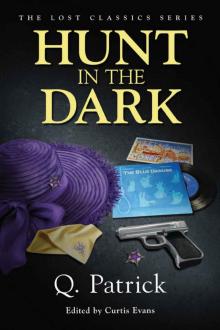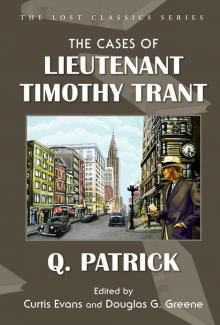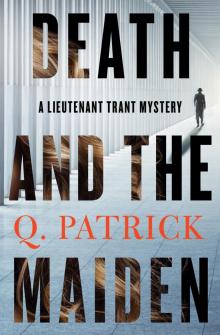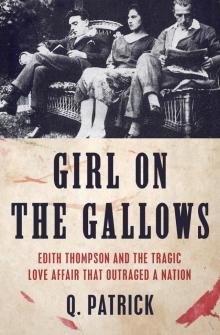- Home
- Q. Patrick
Death and the Maiden Page 2
Death and the Maiden Read online
Page 2
Then the lights dimmed before the solitary amber spot which heralded the floor show, and we joined the others.
The show was opened by a torch singer whose voluptuous figure thrust perilously out of a strapless evening gown. She moved from table to table crooning the words of a current hit song. At our party she stopped directly in front of Steve and moaned a complete chorus at him, her strapless gown strained to its uttermost by her deep-chested lamentings.
I was surprised at Steve’s embarrassment. I would have thought his celebrated poise could have withstood far worse things than the possible collapse of a lady’s superstructure. But after the first few lines he kept his eyes fixed on the enameled lighter which he clicked nervously back and forth. His relief, when the girl drifted to another table, was obvious.
There was some perfunctory applause for the singer. Then Elaine leaned across the table and prodded me with a fork.
“First intermission,” she shouted in a voice which had quite enough champagne in it. “Time to go over and make bright comments at Phèdre.”
Norma was concentrating hard on the President of Dramatics, either after his fraternity pin or the star part in the next college show. I knew it was useless to try to pry her loose, so Elaine and I went off together to uphold the dignity of the Wentworth Seniors.
Somewhere on the way to the door I lost Elaine. But just as I was going on without her, she rushed after me down the stairs.
“My dear, I’ve just been accosted. That torch singer positively swooped down on me and asked me questions about the party. Apparently they run a gag for birthdays and they wanted to know all about Steve. I had a wonderful time letting myself rip.”
“What did you tell her?”
“Everything, my dear—about Steve’s father being the next Republican President. I said the family was rich as Rockefeller.” She pushed giddily through the swing door and out into the street. “Oh, yes, she asked about you, too. Wanted to know if you were Steve’s fiancee.”
“Elaine, darling, you didn’t say I was?”
She giggled. “Of course I did. I said he was going to announce his engagement tonight and that Norma was a discarded blonde from his dirty past.”
We must have looked like a couple of refugees from a police raid as we dashed across the street without our wraps. And the lights and the crowds were so bewildering that we missed the Cambridge and found ourselves in the foyer of the theater next door where the billboard announced that a Gilbert and Sullivan Repertory was presenting H. M. S. Pinafore and Cox and Box. I had some difficulty in persuading Elaine that we were in the wrong theater, and by the time we arrived at the Cambridge, the audience was already streaming out.
The first person we ran into, of course, was Marcia Parrish. I hated the idea of putting on an act for her. Marcia Parrish was the one faculty member we all really liked, and it was still a nine days’ wonder on the campus that Dr. Robert Hudnutt had married the cold, British Dean of Women when everyone knew he’d had a good chance of getting Marcia.
With her white satin gown and her dark hair pushed back from her forehead, the Head of the English Department looked cool and lovely as a narcissus. But, as she came up to us, I was startled at the determined gleam in her eye.
“Where’s Grace Hough?” she asked.
“I—I think she’s inside,” Elaine spoke too quickly, too eagerly. “Do you want us to get her for you?”
“Yes.” Marcia’s lips tightened. “I have to speak to her. It’s urgent.”
While I was trying to figure out why on earth Marcia Parrish should want my roommate so urgently, Elaine grabbed my arm and started pulling me away past programs, tuxedos and powdered backs. Finally we caught a glimpse of Grace’s pink satin in a deserted corner of the foyer. Standing at her side, his back to us, was a tall man with dark hair.
“The mysterious boy-friend at last!” hissed Elaine, plunging eagerly forward. But as the man half turned, she came to an abrupt halt and muttered: “Damn, it isn’t the boy-friend. It’s Hudnutt.” Without warning she swirled off in another direction.
Neither my roommate nor Hudnutt seemed conscious of me as I moved toward them. Grace was standing against the wall, her hands clenched at her sides. The professor of French, slim and slightly stooped in tailored dinner clothes, was very close to her. I could see only his profile but his sensitive features were contorted into a haggard travesty of themselves.
I was surprised to see the two of them like that. I was astounded when I heard him say:
“I’m sorry but you absolutely misunderstood what I told you this afternoon in the quarry. It’s all a ghastly mistake. Don’t you see how you’re senselessly destroying your own chance of happiness and mine….”
I must have made some involuntary exclamation. Instantly he broke off and swung round. For one second his face was completely off its guard. And I noticed that the scar on his left temple, usually almost invisible, was standing out, livid against the white skin.
Then, with the poorest attempt at a smile I had ever seen, he moved away. He never once turned to look at Grace.
But I did. And the expression in her eyes is something T shall always remember. Unnaturally bright above the pink cheeks and the lips of clumsy crimson, they held a gleam which was at once exultant and malicious.
“Why, Grace,” I said, “what on earth’s the matter? Why…?”
But with a little choking sob, she pushed past me and disappeared into the crowd that was trooping back for the second act of the play.
I started to follow her, determined to find out what was the matter and what was behind that extraordinary snatch of conversation. Then I stopped abruptly, realizing that there could be only one explanation. Grace’s letter-writing friend had failed to turn up; she was bitterly disappointed; and for some obscure reason she’d been taking it out on the man she had once admired—Robert Hudnutt.
Apparently the episode had puzzled Elaine, too, for as we made our way back to the Amber Club, she said: “Looks as if the correspondence course has flunked dear Gracie. But what on earth was she talking to Hudnutt about?”
“Oh—just the play,” I said.
I never knew what instinct prompted me to lie to Elaine about that crazy scene. Later it was to prove one of the most tragic errors I made in the whole affair.
As soon as we got back to the party, Elaine cornered Steve and started to give a dramatic version of her encounter with the torch singer. I had expected him to take it in the frivolous mood it rated. But he didn’t. In the middle of Elaine’s story, he turned his back on her and pulled me onto the dance floor.
“She must be crazy,” he muttered. “Does she think it’s funny telling that floor vamp about my father and saying I’m engaged to you?”
I was surprised at his anger and nettled by his last remark. “You needn’t object quite so strenuously,” I said. “After all, you don’t have to disgrace the Carteris name by marrying me, you know.”
Steve flushed. “I didn’t mean it that way, Lee,” he said awkwardly. “You know I’d never …”
“Skip it, nit-wit,” I said.
I had made up my mind to tell him about Grace but at that moment a waiter tapped him on the shoulder and announced that a lady wanted to speak to him on the telephone urgently. I supposed someone at Wentworth was pulling a sophomoric birthday gag, but Steve didn’t come back for almost twenty minutes and, when he did, I was amazed at the change in him. He looked disturbingly grim.
He came straight up to me, gripping my hands. “Lee, I’m terribly sorry, but I’ve got to leave at once.”
His expression frightened me. “Steve, has something awful happened?”
“Something awful will happen if I don’t get out of here right away. Can you explain to the others, please?”
“Steve, tell me. It isn’t anything to do with Grace, is it?”
“Grace Hough? My God, what makes you think that?”
“I …”
“Listen, Lee. Will you do me two
favors? First don’t ask any questions about this. Second, for the love of Pete, don’t discuss it with Grace. That girl’s got me into enough trouble already.” He broke off, then added with an unpleasant laugh, “One day Grace Hough will wake up and find herself strangled.”
Before I had time to reply he swung away, disappearing through the dancers.
I made feeble apologies for him to the others. They seemed to think it a rather good joke and merely asked if Steve was in woman trouble again and what her name was this time.
I was quite glad when the time came to go over to the Cambridge for the second intermission. Elaine, having added a highball to the indiscretion of champagne, was in no fit state to accompany me. So I went alone.
My mind—reasonably or unreasonably—was obsessed with Grace. I found myself looking eagerly for her as I threaded my way over to the Cambridge.
I had no difficulty in finding her. She was standing close to the door, with my coat slipped over her dress as if she was intending to leave. At first I thought she was alone. It was not until I had pushed my way closer that I saw she was with a man. He was a naval officer in full dress uniform, his coat bristling with gold braid and buttons.
Grace caught sight of me and beckoned. Her mood had changed completely since her incredible scene with Dr. Hudnutt. She was gay and excited and her voice had a triumphant ring in it as she linked her arm in the naval officer’s and said:
“David, this is Lee Lovering, my roommate.”
The naval officer smiled, showing perfect teeth. He was somewhere in the interesting thirties and unquestionably handsome. And yet, for some obscure reason, he was not as attractive as he ought to have been. Even then, before that man became a vital, an almost mythical factor in the lives of all of us, I remember thinking that the magnificent hair was just a shade too long and that his features were just a little too regular. Besides, a uniformed naval officer seemed utterly out of place in Grace’s life, just as he seemed out of place in that super-intellectual crowd who had come to listen to the classical lucubrations of Phèdre.
And he seemed very conscious of his own incongruity. Grace chattered excitedly, but he said scarcely a word and made no attempt to conceal his relief when the time came to escort her back into the theater for the last act.
On my return to the Amber Club, I found the party completely disintegrated. Elaine and Nicholas Dodd, Steve’s roommate, had disappeared; Norma was displaying her sophistication by dancing with a rather oily-looking man from another table.
I was all set to call it a day. Luckily, just about the time Phèdre was scheduled to finish, Elaine reappeared, looking rather green and announcing an emphatic desire to go home. I left her to tackle Norma and hurried over to the Cambridge to collect Grace.
I couldn’t have timed myself more successfully. Just as I reached the foyer, the faculty party came out of the house and I was able to fiddle convincingly with my wrap, thus maintaining the farce to the bitter end.
It was just after they had gone that I saw Grace pushing through the outgoing crowd. She was alone and peering anxiously to left and right. I called and she hurried to my side.
“Come on,” I said. “Norma and Elaine are getting the car.”
She shook her head and said rather breathlessly: “I’m not coming with you, Lee. David’s driving me home. But I do want you to do me a favor.” She opened her pocketbook and held out three sealed envelopes. “Could you please deliver these for me at Wentworth?”
I had just time to see the topmost letter. It was addressed in her ornamental back-sloped writing to Jerry at the infirmary. Then, abruptly, Grace snatched the envelopes back and put them in her bag again.
“No, perhaps it would be better if …” She broke off. For a moment she stood there in front of me, her small face illuminated with an excited smile. “Lee, I’m so happy tonight, so marvelously happy that I’m going to say something I’d never have said at any other time. It’s about you and Jerry.”
I felt rather awkward. During all the years we had known each other, Grace had never referred to my feeling for her brother.
“You don’t have to worry about Norma getting his fraternity pin—or anything else from Jerry, Lee. He may think he’s crazy about her now, but it’s you he really likes. He’s always been terribly fond of you.”
She came closer, clutching at my hands. “I’m going to make him realize just how rotten Norma is. She’s jeered at me, but she’ll be sorry for it just the way other people in Wentworth will be.”
At the beginning of this remarkable speech I had felt a wave of gratitude for Grace. It subsided as I realized that it had been motivated far more by vindictiveness toward Norma than affection for me.
“Yes, Lee.” Grace laughed unsteadily. “No one is going to make me hate them without regretting it.” She pulled me closer and kissed me impulsively on the cheek. “Well, I’ll have to hurry. David’s waiting.”
She hurried down the theater steps to the street. I caught a glimpse of the red-haired naval officer, hatless and impatient on the fringe of the crowd. I saw the two meet; saw Grace slip her arm through his, small and fragile beside that tall, uniformed figure.
I think it was then, for the first time, that I began to realize the potential menace lurking in my roommate’s slight figure. Grace, who until that night had been so pallid and unimportant a person, seemed somehow to have insinuated herself into the emotional life of so many of us. I thought of the anxiety on Marcia’s face when she had asked to speak to Grace; I thought of the blind terror in Robert Hudnutt’s eyes when he gazed down at Grace in the theater foyer; I thought of Steve, grim and tight-lipped, when he had asked me not to mention his departure from the Amber Club to Grace. All the queer, disturbing things that had marred the gaiety of that evening seemed to have had their beginning and ending in Grace.
As she moved away with the naval officer, my roommate turned, waved her hand and called: “Goodnight, Lee.”
Now, as I look back, there seems something oddly valedictory about those three casual words and that brief flutter of her hand.
For I never saw Grace Hough again—alive.
III
I suppose it was about one-thirty when we left the Saylers’ maroon sedan in the college garage and made our way back to Pigot Hall. We were all suffering from after-the-party blues.
One fact alone intruded persistently into my thoughts as I closed the door on Elaine’s dyspeptic goodnight, Grace had said that Jerry was terribly fond of me. I let that lull me to sleep.
And, if it hadn’t been for my Spartan habit of keeping the window wide open, I might have gone on sleeping until morning; I might never have seen those three things which later were to involve me so dangerously in the lives of other people at Wentworth. But my window was open and the rain, spattering cold on my face, wakened me at some later, indeterminate period of the night.
I was too full of sleep to wonder whether Grace had come back. I merely staggered out of bed and started to tug down the window. While my fingers fumbled over the sash, the steady drone of a car engine caught my attention. Almost immediately a wide shaft of light illuminated the rain-flecked darkness of the campus, and a car hurtled into view, driving away from the college as if all the hounds of hell were galloping in pursuit.
That speeding car was the yellow sedan which belonged to Penelope Hudnutt.
If I had known what was going to happen, I would have paid far more attention to that yellow sedan. But at the time I merely wondered sleepily why on earth the impeccable Dean of Women should me careening through the campus so late at night. Then I flopped back into bed again.
I can’t actually have fallen asleep. I must have been suspended half way between dreams and waking or I would not have been so immediately conscious of the faint click of the opening door.
“So Grace has come back at last,” I told myself. “About time, too.”
The footsteps came right up to my bed and stopped. I was conscious of a figure bending over me,
blurred like something in a dream. Then it slipped away toward Grace’s bed. I waited for the familiar sound of my roommate’s fingers pulling back the covers.
But it didn’t come.
“That’s queer,” I thought sleepily.
Then I stopped thinking, for the footsteps sounded again—this time even softer, more stealthy than before. They were moving away from the bed, back toward the door.
I don’t know why that should have frightened me. After all, Grace might easily have forgotten to shut the door. There were a dozen perfectly normal explanations. But, in my sleep-drenched state, that struck me as horribly wrong.
I sat up in bed and peered forward. Although everything was out of focus in the darkness, I could distinguish a figure almost at the door.
“Grace!” I whispered. “Is that you?”
For a moment the figure stood absolutely still, a dark, slender silhouette against the lighter darkness of the wall. Then it slipped out through the door and disappeared.
I was really awake then; awake enough to realize with a twinge of panic that the person who had crept into my room had not been Grace Hough.
The rain, which had been drizzling down when I woke for the first time, had increased in violence now and was beating against the window pane. But as I moved barefoot toward the dressing-table, I caught once again the dull throb of a car engine from the campus.
I supposed it was the Dean’s yellow sedan returning from its unknown mission. But I was wrong. This car, like the first, was driving headlong away from the college. The fanlight from the porch illumined its green, rain-polished body, and I recognized it immediately.
It was Marcia Parrish’s convertible coupe.
For quite a while after that second car had vanished I stood at the window. Then I looked at my watch.
It was 4:20 A.M. First Penelope Hudnutt, then Marcia Parrish dashing away from the college at that time of night; and an unknown person creeping into my room!

 Death Goes to School
Death Goes to School Hunt in the Dark
Hunt in the Dark The Cases of Lieutenant Timothy Trant (Lost Classics)
The Cases of Lieutenant Timothy Trant (Lost Classics) Death for Dear Clara
Death for Dear Clara S.S. Murder
S.S. Murder Death and the Maiden
Death and the Maiden The Grindle Nightmare
The Grindle Nightmare Cottage Sinister
Cottage Sinister The Girl on the Gallows
The Girl on the Gallows